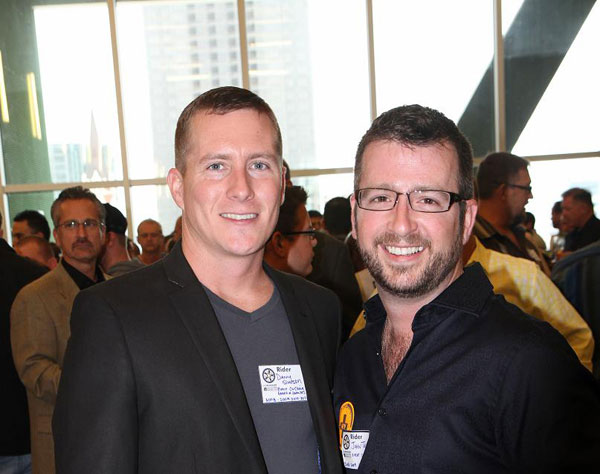2011 LSRFA co-chairs John Tripp and Danny Simpson lead the annual fundraising event into a new decade
M.M. Adjarian | Contributing Writer
editor@dallasvoice.com
This year — 2011 — marks the first year of the second decade that Lone Star Ride Fighting AIDS has been in existence. For event co-chairs John
Tripp and Danny Simpson, it’s the beginning of a new era for both the organization and in the struggle to eradicate a devastating disease.
Tripp and Simpson have a big job. As co-chairs, they are tasked with keeping LSRFA organizers and cyclists motivated to keep going throughout the year and focused on the September weekend when the event actually takes place.
“Everybody knows why we are here, but at the end of the day, we’re all volunteers. [John and I] are the [organization’s] cheerleaders,” says Simpson, a portfolio revenue manager for the International Hotels Group.
Both men came to the LSRFA in 2008. But where Tripp, a resources professional for Deloitte & Touche, started — and still continues on — as a cyclist, Simpson started as the organization’s events and ceremonies planner.
The pair finally began working together as co-chairs this year. Their goal is simple: to build upon the foundation established by their predecessors and grow the ride.
Achieving that goal has been a challenge — but one they welcome.
“We’re really focused on getting our brand out there and getting recognized and making people understand who we are,” says Simpson.
Adds Tripp, “[It’s vital that we can communicate] with our community to say, ‘This is our story and this is why we do what we do.’”
The co-chairs also plan on transforming the LSRFA by making the actual ride more visible than it has been in the past.
“This year, one of the things that [event manager] Jerry Calumn heard unanimously from all riders was that they wanted a route that was more visible and could be seen by communities we were supporting,” Tripp explains. “There are serious pockets of our community that have never heard of us and have lived in Dallas-Fort Worth for many years.”
Partnering with fundraisers such as Neiman Marcus’ Fashion’s Night Out and Audi Dallas’ Casino Night is yet another operational change that Tripp and Simpson are currently overseeing.
As deeply committed to the organization as the two men are, neither has much time to spare. But the sacrifice is well worth it and is, in their eyes, a necessity.
Observes Tripp, “HIV infection rates are skyrocketing within minority communities, the LGBT community [and among members of] the youngest generations, but now that people aren’t dying, the disease is not as high profile.”
The medications that now exist to control HIV/AIDS are at the heart of this newest twist in the epidemic. While the medications have saved countless lives, they have also given rise to a dangerous complacency that if left unchecked, make HIV/AIDS become even deadlier than it already is.
“What [really] frustrates me is that the younger generation isn’t understanding that they’ll face drastic differences in their aging process because of HIV,” Tripp says. “ Their organs are going to have to deal with these medicines for the rest of their lives.”
And with the economy in a weakened state, supporting organizations that provide services for those suffering from HIV/AIDS has now become more critical than ever before.
“If you are lucky and have healthcare,” says Tripp, who is HIV-positive, “you could probably survive on and afford your medications every month for anywhere from $240 to $2,000 per year. What happens, though, if you run out of your healthcare or are suddenly unemployed?”
The AIDS crisis has not gone away; it’s only changed form in a world that has also changed. Combating it will require new tactics, but Tripp and Simpson are up to the challenge and boldly look forward to joining with others in the fight.
“[You may be] upset that you are having to help other people and are having to help them pay for their medicines through social welfare programs,” says Tripp. “[But] what are you doing to fight [the disease]?”
Lone Star Ride Fighting AIDS will be held Sept. 24-25. To donate to an individual rider, to a team or to the Ride itself, go online to LoneStarRide.org.
This article appeared in the Dallas Voice print edition September 23, 2011.















Thank you both for your enduring commitment to the cause and to this event!